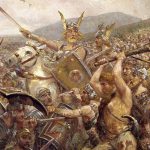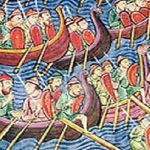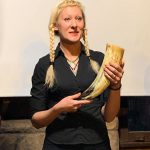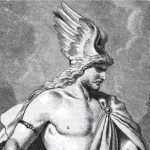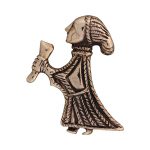
“Joyous then was the Jewel-giver, hoar-haired, war-brave; help awaited the Bright-Danes’ prince, from Beowulf hearing, folk’s good shepherd, such firm resolve. Then was laughter of liegemen loud resounding with winsome words. Came Wealhtheow forth, queen of Hrothgar, heedful of courtesy, gold-decked, greeting the guests in hall; and the high-born lady handed the cup first to the East-Danes’ heir and warden, bade him be blithe at the beer-carouse, the land’s beloved one. Lustily took he banquet and beaker, battle-famed king. Through the hall then went the Helmings’ Lady, to younger and older everywhere carried the cup, till come the moment when the ring-graced queen, the royal-hearted, to Beowulf bore the beaker of mead. She greeted the Geats’ lord, God she thanked, in wisdom’s words, that her will was granted, that at last on a hero her hope could lean for comfort in terrors. The cup he took, hardy-in-war, from Wealhtheow’s hand, and answer uttered the eager-for-combat. Beowulf spoke, bairn of Ecgtheow: “This was my thought, when my thanes and I bent to the ocean and entered our boat, that I would work the will of your people fully, or fighting fall in death, in fiend’s gripe fast. I am firm to do an earl’s brave deed, or end the days of this life of mine in the mead-hall here.” Well these words to the woman seemed, Beowulf’s battle-boast.—Bright with gold the stately dame by her spouse sat down.”
In this passage from Beowulf ( lines 607-641) we have one of many references to women as cup-bearers, particularly during sumbel. Evidence, in runic inscriptions as well as in literature, abound. What was once a jealously guarded privilege held by women of nobility has become a role that seems little understood by both the men and women of Asatru. Speaking specifically in terms of Sumbel, many Asatruar forgo the use of a horn-bearer altogether in favor of the simpler passing of the horn. Why overlook a simple formality that was so important to our ancestors?
First we must consider the real role of our ancient horn-bearers. The Lady of the Hall was the only women who was ever expected to attend sumbel with the men, and it was she who chose the women who would aid her in the task of keeping the men’s cups full. It was the Lady of the Hall who chose the seating arraignments, usually by rank or dignity. And it was the Lady of the Hall who was the first to handle the horn, offering it in greeting to men as they entered, and most especially, passing the horn during Sumbel — a task that was held in the utmost esteem.
It was considered imperative to our ancestors that the holy drink pass through the hands of a women in between each toast. Widely recognized was the “special provenance” of women — the healing touch, or nourishing main that was so innate in them. They are the frith-weavers, the peace-keepers, and even something as simple as their touch could balance the energy. So from toast to toast, the woman’s touch helped to balance the more contentious energies of the men.
There is also evidence to lend credence to the idea that the horn-bearers, while respectful, were often not just silent witnesses to the sumbel. Often they were sought after to give womanly advice, to help sooth jangled nerves, or to step in and settle tensions between men before the possibility of Frith being broken.
Why is this important? In a world of rampant anti-traditionalism sometimes it is important to take the time to find the small formalities, to bring back the traditional roles of our men and women. We should also consider how the inherent abilities of women can be useful today.
To begin, we consider that women are still frith-weavers and peace-keepers. And men are still contentious by nature. Couple that with the fast pace, generally angry world that we currently live in and the possibility of that chaotic energy mixing into the horn is high. What better way to combat that than by having a women pass the horn from one person to the next? It is not an easy task, however. It isn’t just a matter of handing the horn off. A woman who is chosen to carry the horn becomes the protector of the horn, of the frith of the horn. Thusly, it is her duty to calm an agitated toaster, or to help someone who might need help. Above all things, it is her job to maintain the frith of the hall.
We must also consider the formality, the tradition of the role. It is not uncommon for the horn-bearer to treat the task as a chore. How often has it been seen that the women carrying the horn is disinterested in what is being said? Or that she was fidgety and seemed to wish to be elsewhere? How often as a woman acted as though she would rather not be carrying the horn? While this behavior is generally not seen in the AFA, it can be seen outside of it. But why?
Maybe it is because the women don’t realize the importance of the task. Maybe it is because they don’t understand that they have been honored. There is no real answer to this. What we can do is to simply make sure that our women and our men know that to be chosen to carry the horn is, indeed an honor. It is a recognition of hard work. It is a recognition of dedication. It is the singling out of one woman above the others, not to embarrass, but to rise up. A gythia carrying the horn does so because she understands the enormity of the task, because it is her duty, and because it is her pleasure. For all others it is a recognition and celebration of excellence, and as such it needs to be earned.
By honoring the role of horn-bearer we are endeavoring to fill the horn with the frithful energy of women. We are bringing back traditional roles that we need to help fight back against the anti-traditional world we live in. We are honoring our ancestors by taking up their customs. And above all else, we are elevating our ladies!
Catie Erickson
Gythia in Training

